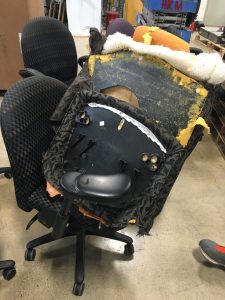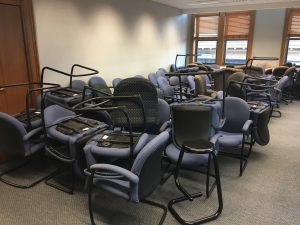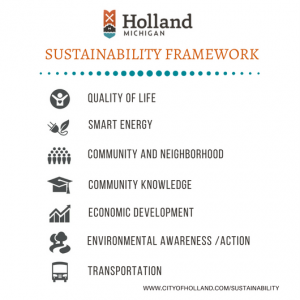By Aaron Thelenwood and Ken Freestone, City of Holland
The City of Holland is putting its Sustainability Framework to work by looking at ways to reduce waste in all its facilities – repurposing used items, reselling outdated equipment and working with local nonprofits to recycle and recover scrap materials.
 For example, the city recently ordered new office chairs. When city staff learned most of the old chairs were destined for the landfill, the staff looked for ways to repurpose any usable items and capture recyclable materials.
For example, the city recently ordered new office chairs. When city staff learned most of the old chairs were destined for the landfill, the staff looked for ways to repurpose any usable items and capture recyclable materials.
The results: 110 old chairs were removed with approximately 90 percent of materials diverted from the landfill. Subsequently the Holland Board of Public Works coordinated with city employees to process an additional 35 office chairs for recycling. And within 30 days, another city department diverted another 65 very old, metal folding chairs.
 In total, material from 200 chairs was kept out of the landfill.
In total, material from 200 chairs was kept out of the landfill.
City employees are now building on this success and applying the city’s Sustainability Framework to identify opportunities to reduce waste, leverage resources, and reduce the city’s waste-to-landfill stream.
By thinking creatively, using community resources, and taking time to analyze the types and amounts of waste, staff are better equipped to establish policies to minimize the amount of materials sent to the landfill.
 The City’s Sustainability Framework identifies seven guiding principles:
The City’s Sustainability Framework identifies seven guiding principles:
Community Knowledge – encouraging others to support sustainability;
Smart Energy – making wise, energy efficient choices;
Environmental Awareness/ Action – thinking about the impact of every project during planning stages;
Community and Neighborhood – fostering vibrant, sustainable neighborhoods;
Transportation – finding better ways to transport people, move goods and deliver services;
Economic Development – becoming the preferred location for business;
Quality of Life – ensuring access to healthcare, affordable housing, parks, recreational opportunities, cultural events, educational excellence and more.
Anyone, not just city government, can think of waste reduction in the context of those categories. For more details on Holland’s sustainability efforts, go to www.cityofholland.com/sustainability. Go to www.greenmichigan.org for tips on implementing the principles.
Decisions we make sometimes may have consequences that are unintended. By making decisions in the context of the Sustainability Framework, we are more likely to have quality results that improve our lives, minimize negative results and result in quality consequences.
Another set of questions, related to what’s known as the triple bottom line, can also guide decisions:
Social Issues: How will today’s decisions impact the people in our community, both today and tomorrow?
Environmental Issues: How will today’s decisions impact the environment? Remembering that environmental issues may not immediately apparent, you may need to think generationally.
Economic Issues: What impact will our decisions have on businesses, employment, incomes and values of goods and services, both today and tomorrow?
Sustainability is not a one-time thought, a one-issue decision or about one person. It is the framework for all decisions, long-term, and for all people and creatures.
Ken Freestone is Holland’s residential energy advisor, focusing on home energy retrofits for city residents and is also co-founder of GreenMichigan.org, a nonprofit focused on sustainability. Aaron Thelenwood is solid waste and recycling education coordinator for Holland.
![]() This Week’s Sustainability Framework Theme
This Week’s Sustainability Framework Theme
Community & Neighborhood: The places we live and the individuals we interact with support the development of our personalities and perspectives on life. Encouraging vital and effective communities is essential.
![]() ABOUT THIS SERIES
ABOUT THIS SERIES
Living Sustainably is a collection of community voices sharing updates about local sustainability initiatives. It is presented by the Holland-Hope College Sustainability Institute, a joint project of Hope College, the City of Holland and Holland Board of Public Works. Go to www.hope.edu/sustainability-institute for more information.

